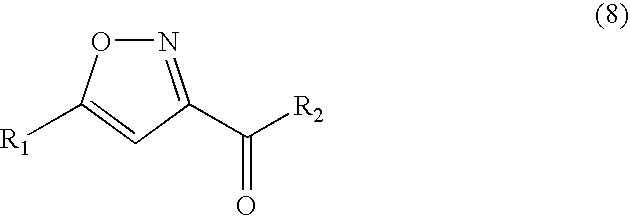Method for manufacturing isoxazole derivative or dihydroisoxazole derivative
a technology of dihydroisoxazole and isoxazole, which is applied in the direction of biocide, drug composition, immunological disorders, etc., can solve the problems of unsatisfactory yield and drive up the cost of discharging waste products, and achieves excellent reagents, easy processing, and low cost.
- Summary
- Abstract
- Description
- Claims
- Application Information
AI Technical Summary
Benefits of technology
Problems solved by technology
Method used
Image
Examples
working examples
[0091]Embodiments of the present invention will now be described in more specific terms through working examples, but insofar as its gist is not exceeded, the present invention is not limited to the scope described in these working examples.
[0092]The substrate, iron(III) nitrate, copper(II) nitrate, aluminum nitrate, magnesium nitrate, ammonium nitrate, and carbonyl compounds used in these working examples of the present invention were all commercially available products.
[0093]The following measurement apparatus were used to measure the structure, properties, and so forth of the isoxazole derivative that is the product of the present invention.
[0094]IR: FT-IR-230, made by JASCO Corporation
[0095]NMR: JEOL GSX400, made by JEOL
[0096]GC: Shimadzu Gas Chromatograph GC-17A, made by Shimadzu
[0097]GC-MS: GCMS-QP5050, made by Shimadzu
[0098]GCL: HP5890, made by Hewlett Packard
Experimental Methodology
[0099]0.1 mol of substrate and 0.1 mol of iron(III) nitrate were reacted in 40 mL of acetone o...
working examples 1 to 8
[0100](1) Reacting acetone or acetophenone with chain-form 1-alkene compound using iron(III) nitrate
[0101]Iron(III) nitrate was made to act in acetone or acetophenone, using a chain-form 1-alkene compound as the substrate (1-hexene (hereinafter “substrate 1”), 1-heptene (“substrate 2”), 1-octene (“substrate 3”), 1-dodecene (“substrate 4”)).
[0102]As a result, as shown in Table 1 below, it was found that isoxazole derivatives (1a-4a, 1b-4b) were obtained at a higher yield than when cerium(IV) ammonium nitrate (CAN(IV)), which is a conventional metal nitrate, was used.
[0103]For almost all the substrates, the yield was higher when acetophenone was used than when acetone was used, the reason for which will be discussed below.
[0104]The following abbreviations used in the tables in this Specification refer to the following groups.
[0105]Me: methyl group
[0106]pH: phenyl group
[0107]
TABLE 1Reaction between 1-alkene compound andFe(NO3)3 in acetone or acetophenoneWorkingSub-Temp.TimeProductCAN (...
working examples 9 to 20
[0108](2) Reacting acetone or acetophenone with various alkene compounds using iron(III) nitrate
[0109]In order to how widely applicable this reaction is, a test was conducted under the same reaction conditions using substrates having various substituents at the allyl position (allylcyclohexane (“substrate 5”), allylbenzene (“substrate 6”), allyl sulfide (“substrate 7”), allyl cyanide (“substrate 8”), allyl phenyl ether (“substrate 9”), and allyl acetate (“substrate 10”).
[0110]As a result, as shown in Table 2 below, the yield was somewhat lower with some of the compounds than in the reaction with a chain-form 1-alkene compound, but it was confirmed that the reaction proceeded even when the side chain was not an alkane. It is possible that this fluctuation in yield is due to the presence of hetero atoms at the allyl position, causing the reactivity of double bonds to vary, which is unlike the situation with the chain-form 1-alkene compounds. It was clear that the yield was higher with...
PUM
| Property | Measurement | Unit |
|---|---|---|
| temperature | aaaaa | aaaaa |
| temperature | aaaaa | aaaaa |
| pressure | aaaaa | aaaaa |
Abstract
Description
Claims
Application Information
 Login to View More
Login to View More - R&D
- Intellectual Property
- Life Sciences
- Materials
- Tech Scout
- Unparalleled Data Quality
- Higher Quality Content
- 60% Fewer Hallucinations
Browse by: Latest US Patents, China's latest patents, Technical Efficacy Thesaurus, Application Domain, Technology Topic, Popular Technical Reports.
© 2025 PatSnap. All rights reserved.Legal|Privacy policy|Modern Slavery Act Transparency Statement|Sitemap|About US| Contact US: help@patsnap.com



